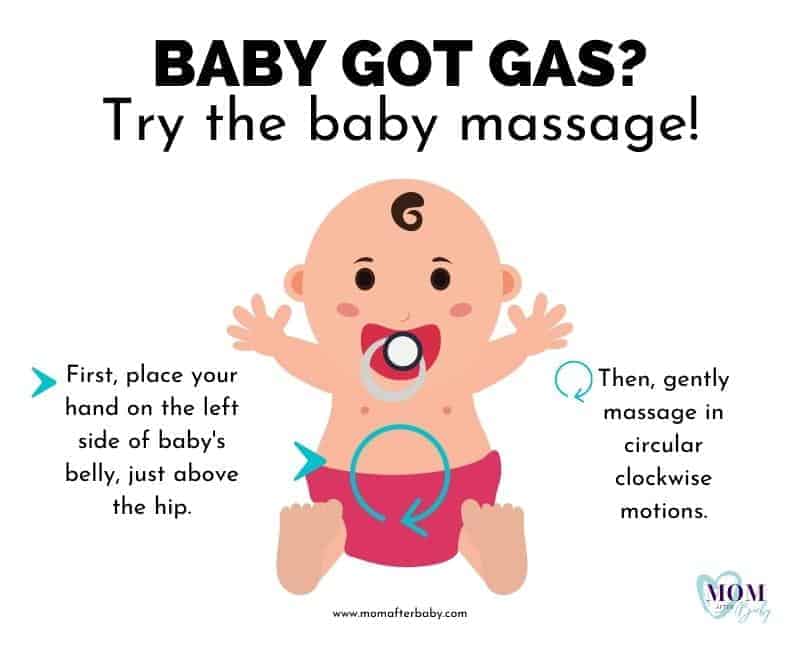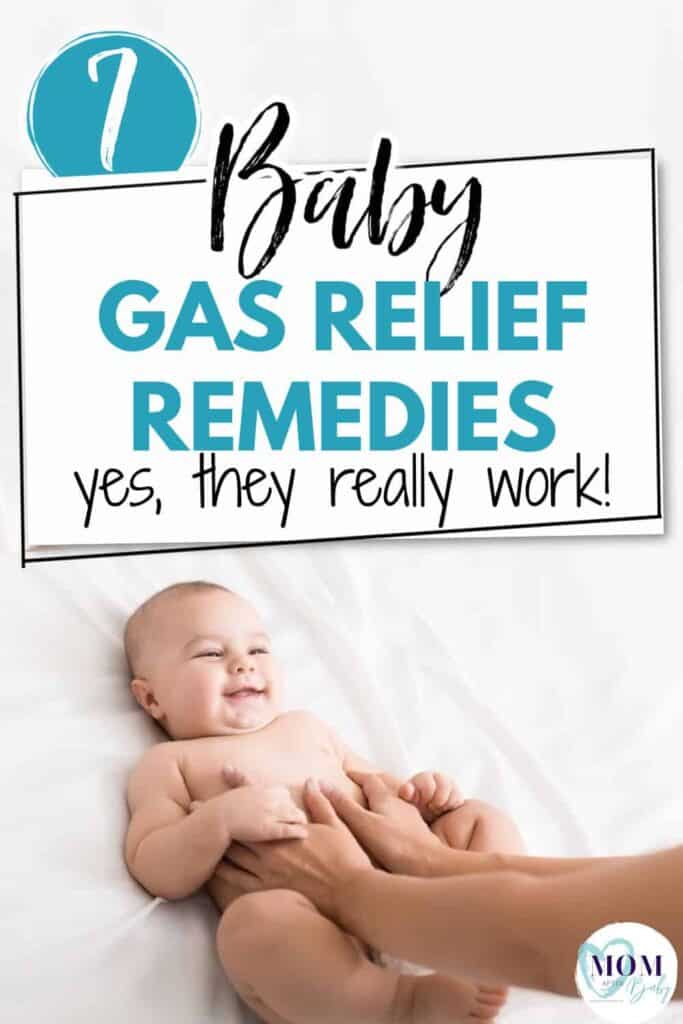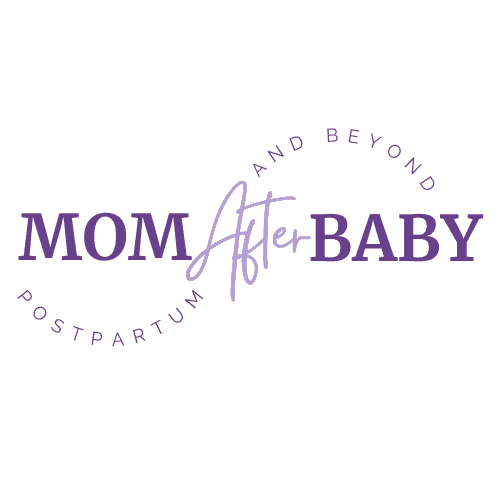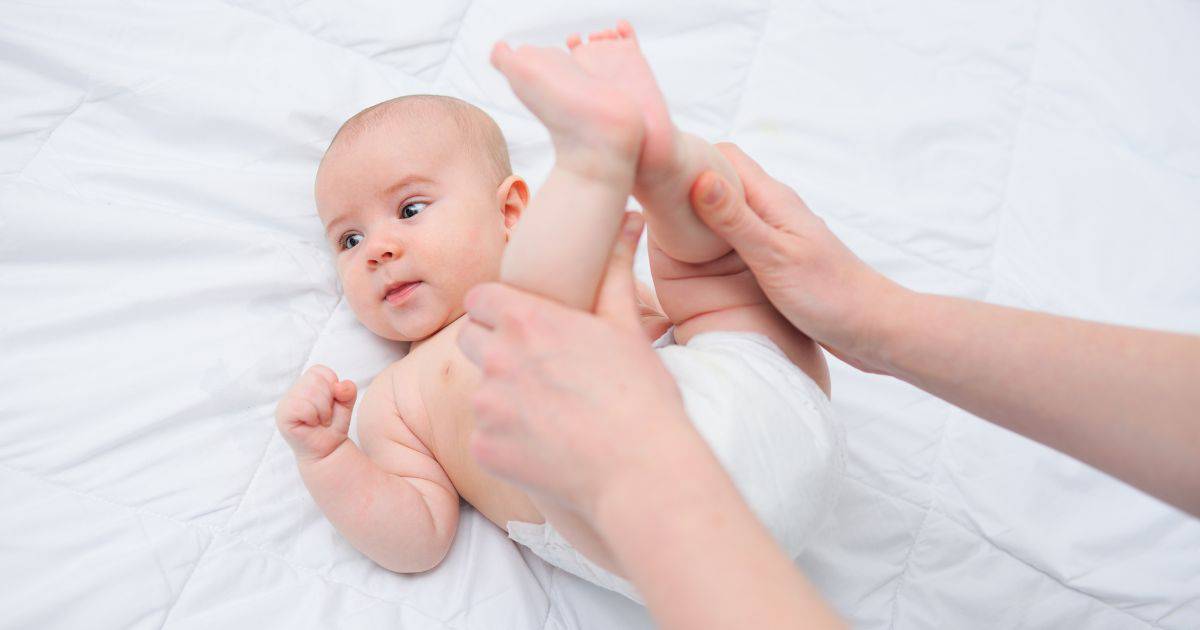How To Get Rid of Baby Gas FAST
This post may contain affiliate links that I may receive a commission from if you click & buy. In addition, the information on this site is NOT intended to be medical advice. See my full policy for more information.
Is your baby screaming with gas pain day after day? Learn how you can help
Is your baby screaming with gas pain day after day? Are you out of ideas to help find them some relief? These home remedies for baby gas relief worked wonders for my own babies and hopefully, they can work for yours too!
Oh, the dreaded baby gas. I’ll never forget the day I experienced my newborn screaming and crying out in pain from gas pains. I spent so much time looking up “how to get rid of baby gas fast”, just to see the same 2 tips repeated over and over again:
- Baby Bicycle Kicks
- Burping Baby
Unfortunately, they weren’t working for my son. Though they have worked wonders with my 2nd baby, my first was always a tricky little fella. So that’s why I want to share these gas relief remedies parents often overlook and best of all, you can use them at home or on the go.
First Understand, Why Do Babies Get Gas in The First Place?
Babies get gas because air gets into their digestive system. Imagine sucking on a bottle with a poor latch — the baby is essentially sucking in lots of air as he or she eats.
In fact, it’s completely NORMAL for babies to experience gas since babies don’t have a mature digestive system yet either.
Some babies will pass gas upward of 20 times a day! However, the problem lies when there is too much air in your baby’s tummy or their digestive system isn’t able to pass the gas, leading to uncomfortable stomach pain.
How To Tell if Baby Has Gas?
First, I just want to say, you will definitely know when your baby is experiencing baby gas pains. Think back to the last time you had bad gas pains — they’re pretty painful, right?
Unfortunately, babies don’t understand why their little tummies hurt. All they know is it hurts and they’re uncomfortable. So, cue the non-stop arching and crying.
Here are some common signs your baby is experiencing infant gas:
- Excessive fussiness
- Bloated/Distended Belly
- Arching Back
- Lifting Legs Towards Chest
- Burping Often
- Difficulty Sleeping
- Crying while straining to pass gas
Sometimes, chronic, unmanageable gas pains can be a sign your baby is dealing with acid reflux.
If your baby is continuously fussy and you aren’t able to tell if it could be gas or something else, it’d be a good idea to notify your baby’s pediatrician so they can help you determine what could be wrong.
When do babies outgrow gas pains?
Fortunately, most babies outgrow gas around the time they reach 4-6 months of age.
For babies with reflux, it may linger on a bit longer.
And if your baby has no underlying conditions, but is experiencing lots of excess gas, please let your pediatrician know so they can help you get to the bottom of the cause.
Is your newborn gassy at night — why?
Oftentimes, gassy babies seem to have more discomfort with gas pains at night.
This is usually because your baby’s tummy has had gas stuck throughout the day and once they’re laying down, gravity makes it much harder to pass.
The best way to prevent gas pain from keeping your infant up at night is to make sure you’re helping them to burp & fart during the day.
How to tell the difference between regular infant gas and colic
An important distinction to make when concerned about baby gas is how to tell if it’s gas or baby colic.
Colicky babies usually have a pattern to their fussiness. For example, every evening within the same window of time, your baby becomes inconsolable, fussy, and cannot seem to soothe or calm down.
The rule of thumb for colicky babies is — if it’s happening for at least 3 hours, 3 days a week, for 3 weeks — it’s likely colic.
Though the cries and screams seem similar (plus, they’re never easy to listen to either way & can incredibly triggering for new moms suffering from a postpartum mood and anxiety disorder), gas and colic are very different.
Home Remedies for Baby Gas Relief (how to get rid of baby gas fast)
Now that you have a good understanding of why babies get gas and what it looks like, let’s talk about some awesome home remedies for baby gas relief that typically bring relief rather fast.
Some of the BEST ways to get rid of baby gas is to simply adjust how you do some of your day-to-day things together. For example:
Practice Paced Feedings
Paced feeding is a way of feeding baby by bottle to mimic the natural feeling as if baby was breastfeeding.
This method also works to slow down baby’s gulping of milk so that they aren’t swallowing excessive amounts of air & encourages them to take breaks throughout the feed.
You can practice pace feeding with baby on their side or in an upright position. For an example of how to pace feed, check out the video below!
Burp Baby After EVERY Feed
Making sure you burp baby after every feed is another great way to ensure you’re getting out as much gas as possible (especially before you lay them down on their back for sleep). If you’re practicing the paced feeding method above, you can also use those “breaks” as another opportunity to burp your baby. Just be sure to have a few burp rags (like these ones) on hand in the event baby spits up a little.
Tummy Time Play
Engaging in tummy time throughout the day is another way to help your baby pass gas naturally (especially when you use a really fun play mat like this). Plus, since tummy time helps them to strengthen all those core muscles from their neck, core, and back, it will also help them eventually be able to sit up & be more upright throughout the day — another helpful developmental piece to getting rid of baby gas.
Offer a Baby Massage
A baby massage can not only help get out the gas, but it’s also just simply relaxing & soothing for babies!
Now, the key part to getting out those air bubbles from your baby’s tummy is to place your hand on the left side of their belly and gently massage in a clockwise circular motion. This mimics the way food moves through our digestive system and helps gently push out lots of air the same way.
The infant massage was actually a tip we learned from our pediatric chiropractor and it always soothed our baby when he was uncomfortable. It’s a natural remedy I will always suggest!

Monitor Cues to Prevent Crying
Crying is a common way babies end up with so much gas in their bellies. To prevent this from happening, try to pay attention to baby’s cues BEFORE they start to cry. For instance, if you notice your baby starts sucking their hands when they’re hungry, try offering them food a bit earlier to prevent them from breaking into a crying spell.
Try a nice warm bath
Not that it will help to pass the gas, but a nice warm bath is always very soothing. If your baby’s tummy does end up below the warm, gently moving water, it could possibly help them pass a few gas bubbles too!
Use a slow flow bottle and bottle nipple
This is another great way to minimize the amount of air your baby swallows during bottle feeding. In addition to adjusting your feeding position (through pace feeding), you can also use a slow flow bottle and bottle nipple to alleviate excessive gas from building up.
Truthfully, most babies don’t need a fast flow nipple, biologically, they’re ready to suckle at the breast which often requires more work on their end — so when you use a slow flow nipple, you’re mimicking that response. Compared to using a fast-flow nipple where they don’t need to suckle and end up having to constantly swallow their milk because it leaks out on it’s own.
Consider a different formula
Sometimes, baby formula can have a lot of air bubbles after you’ve mixed and shaken the bottle. Let these settle before feeding your baby.
In addition, some babies have a food intolerance or allergy that causes them to have stomach discomfort and sometimes, gas. If you suspect your child has a sensitivity to their baby formula, notify their pediatrician right away so you can try a new formula for your baby.
Try the Colic Hold
This popular baby carry position is when you lay your baby’s belly down onto your forearm, with their head towards your elbow. You can use your opposite hand to gently pat their back, gently rock them from side to side, or do a gentle bouncing motion.
Not only can this position help your baby expel some excess air, but it is also a very soothing position for them to simply feel comfortable and soothed.
Gripe Water Or Simethicone Gas Drops? Which works best?
If you’ve exhausted all the efforts above, another common way to get your baby some instant gas relief is by using either gas drops or gripe water.
Now, they are NOT the same thing so I’m going to break down their differences below.
What is gripe water?
Gripe water is a liquid supplement you can purchase over the counter that contains a mixture of herbs such as:
- chamomile
- fennel
- ginger
- lemon balm
- licorice
- and some brands use the ingredient known as sodium bicarbonate.
Despite there not being many studies and little evidence to tell us whether or not gripe water is an effective remedy for baby gas, there are lots of naturalistic mamas who swear by it through anecdotal experience. In fact, one study done in 2015 claimed “GW administration does not seem to prevent infantile colic and on the other hand, may be associated with vomiting and constipation.“
Gripe water isn’t just advertised to help with baby gas though, many products state that it can possibly help relieve gas, fussiness, colic, hiccups, and teething discomforts. However, it’s also important to be mindful that gripe water is considered a dietary supplement, meaning, it’s not regulated by the Food and Drug Administration (FDA).
My best suggestion would be to do some research, write down your questions, and discuss them with your pediatrician to decide if gripe water could possibly help your baby. Personally, I have tried gripe water and did not have success with it helping my gassy, colicky baby.
What are gas drops?
Gas drops, on the other hand, are made of simethicone.
Simethicone is an anti-foaming agent that allows for easier gas passing by breaking up the larger gas bubbles into smaller ones.
Unfortunately, studies have also shown that gas drops may not be as productive as they’re talked up to be. One study by the AAP showed that “babies that used simethicone were no more effective than babies who received a placebo“.
Personally, I did find gas drops to be effective in helping my son pass his gas, BUT he also had horrible reflux so his gas build-up got pretty bad at times. All said and done, I used gas drops with the approval of my pediatrician when the natural remedies didn’t provide any infant gas relief.
If gas drops are one of your last-ditch efforts, I suggest treating it the same as gripe water. Research a few brands, write down questions, and talk to your pediatrician about them.
Comforting a gassy baby
Many new parents end up feeling defeated and flustered when dealing with a fussy baby that can’t find any relief. The worst part is that sometimes gassy newborns can have a hard time sleeping if their painful gas isn’t resolved or prevented throughout the day.
Remember, these days won’t last forever, and don’t forget to give yourself some grace during these times, they’re not easy.
If you’ve tried the home remedies for baby gas relief and exhausted the over-the-counter options, revisit the conversation with your child’s pediatrician so that they can help you determine the cause and effective remedies for your baby’s discomfort.
Have you ever tried these home remedies for baby gas relief? Which ones worked for you?
Other BABY/NEWBORN Posts For You:





I feel like I was reading my life with this post … my son is definitely suffering from reflux and horrible gas pains. I feel so bad about it and have literally tried everything you have listed up til this point. The gripe water worked the first time when he was 3 weeks old … and then it didn’t work again after that. One thing that wasn’t mentioned in here are food intolerances or allergies. My first son had tons of intolerances and I was hoping this one didn’t… but I think that’s why he’s having so many issues. I had my milk tested and I’m waiting back on results. In the meantime, I’ve planned to take out the same allergens my other son had: dairy, soy, gluten, eggs and nuts. I’m hoping it helps and starts to give him some relief.
Mama, I am so sorry your little babe is experiencing this. I know it is so hard feeling so helpless as they are in discomfort. Extending so much love your way and I hope they find the source of his discomfort soon so you can both get some relief. xoxo <3